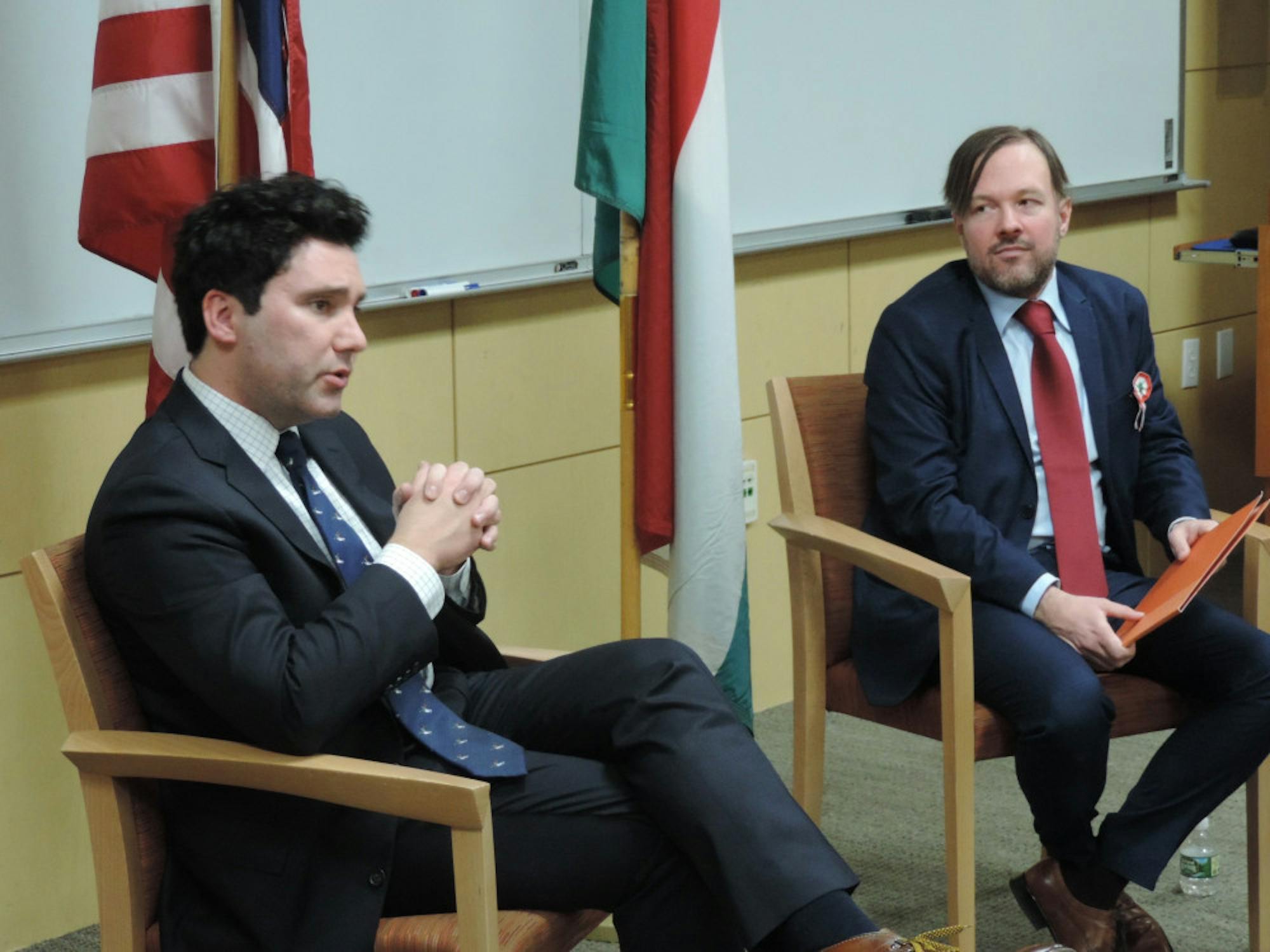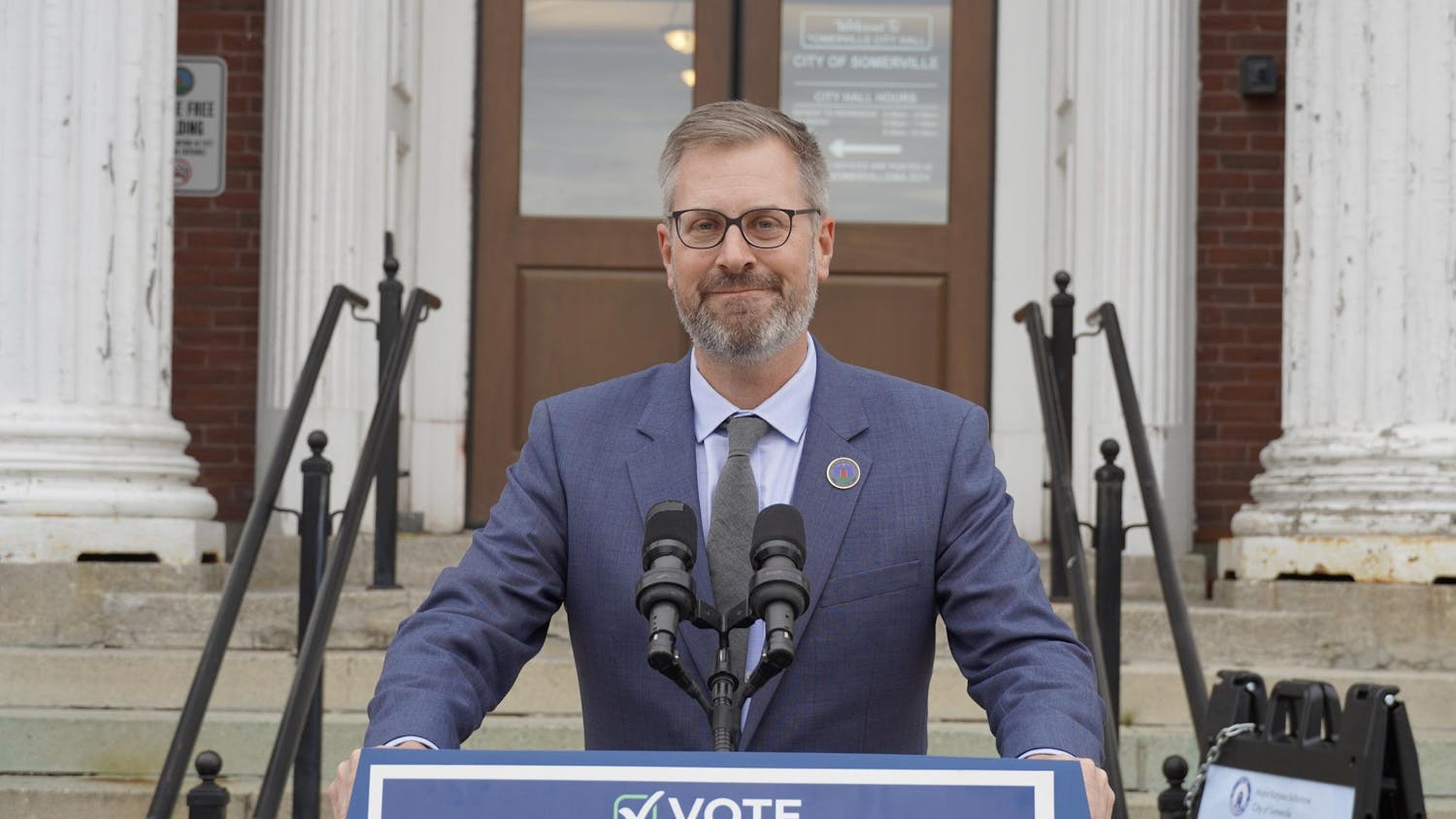Executive Director of the Victims of Communism Memorial Foundation (VCMF) Marion Smith and former Hungarian diplomat Zoltán Fehér, now a research fellow at the Fletcher School of Law and Diplomacy's Center for Strategic Studies (CSS), discussed the history and modern-day implications of the 1956 Hungarian Revolution Tuesday night. The event, titled "The 1956 Hungarian Revolution and the Legacy of Soviet Communism," was cosponsored by the CSS, the Fletcher School's International Security Studies Program, and its Russia and Eurasia Program.
Fehér explained that the date of this talk was significant for Hungarians because it marks the beginning of the revolution against Hungary's communist government.
“The proclamation of the republic, our new independence in 1989, was proclaimed on this day, Oct. 23, as a tribute to the 1956 revolution and the role that 1956 has played in the Hungarian psyche,” Fehér said.
To begin the evening, Fehér invited a handful of Fletcher professors to share their personal stories related to the Hungarian Revolution. Jenifer Burckett-Picker, director of the Ph.D. program, shared her memories of living in the United States in 1956 and that a friend’s family had given refuge to a Hungarian child. Professor of International Politics Richard Shultz, who is also director of the Fletcher School's International Security Studies program, described growing up in a mining town in Pennsylvania and spending hours playing football with young Hungarian immigrants. Visiting Associate Professor Susan Banki (F '06) shared her own story of being the child of a Hungarian refugee, as her father escaped Hungary during the revolution.
To provide context, Fehér gave a brief history of Hungary in the aftermath of World War II. He explained that in 1945, after the conclusion of the war, Hungary conducted free, democratic elections. However, this freedom was short-lived: By 1947, Soviet communists had gained control of the country’s politics.
Fehér noted that 1948 is known by many Hungarians as “The Year of the Turn,” when Hungary officially became a communist dictatorship.
“[They were] probably some of the darkest days in Hungarian history," he said. "They only compare the 1950s' Stalinist regime in Hungary to those of the days of 1944 when Hungary was under occupation by Nazi Germany and Hitler gave free reign to the Hungarian Nazis. Within a decade, Hungary went through hell twice."
Fehér explained that all Hungarian property and businesses were nationalized, including that of his own family.
He detailed the power struggle between Mátyás Rákosi, Imre Nagy and Soviet Leader Nikita Khrushchev, all of whom had varying views on how strictly communism should be implemented in Hungary.
By October 1956, Hungarians were fed up with communism and mounted the first armed resistance against a communist government, according to Smith.
The VCMF works to spread awareness of human rights abuses in communist regimes. Smith said that from Hong Kong to Crimea, the size of today’s “free world” is shrinking, and he cited communism's death toll as at least 100 million people.
Smith gave the examples of Cambodia, China and Venezuela as countries that are still under communist influence. He said that even in these cases, where it is clear that atrocities are being committed, nothing is changing.
“This is both a challenge of understanding what is happening and then the moral courage and political will to confront it and to have a moral reckoning," Smith said.
He noted that U.S. publications did not help the Hungarian cause and instead often printed Soviet propaganda. Smith said this was just one instance of the U.S. not aiding Hungary as it should have.
"The reality is, when [the Hungarian revolutionaries] had pushed the Soviets out of Budapest and were on the airwaves begging for some support in an unprecedented overthrow by young civilians of an occupied communist force, we did not help them,” Smith said. “And that potentially could have led to the breakup of the Soviet bloc.”
Smith said the actions of the Hungarian freedom fighters inspired many anti-communist Americans. However, as Fehér added, though many American civilians wanted to provide more aid to the Hungarians, the U.S. government chose not to do so.
The event was then opened up for audience participation. Questions posed to Smith and Fehér concerned instances of American repression of communist leaders that had negative repercussions, theoretical steps the United States could have taken to support the Hungarians and the significance of a 1956 Olympic water polo match between Hungary and the USSR.






